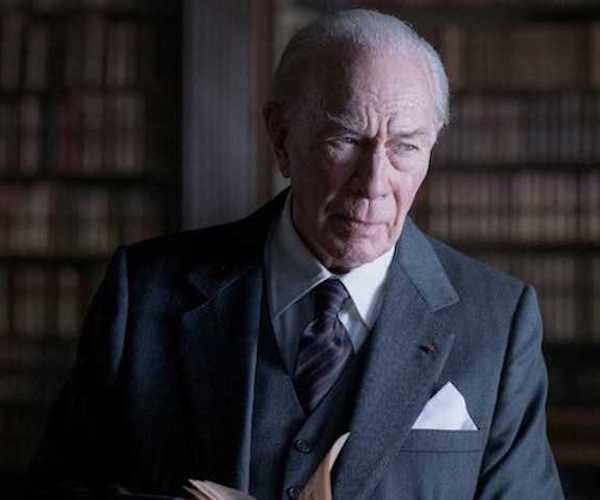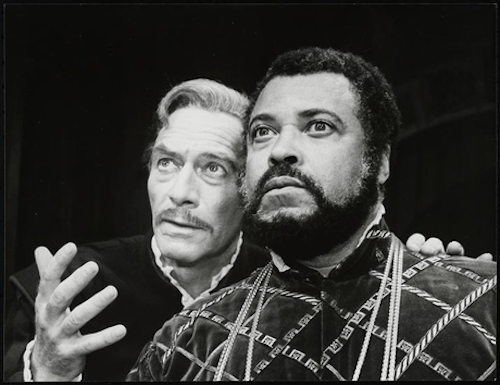Arts Remembrance: Christopher Plummer, 1929-2021
By Peg Aloi
It is difficult to think of a harder-working actor or one more devoted to his craft.

The late Christopher Plummer in 2014. Photo: Wiki Commons.
Like many Americans of my generation, I grew up watching The Sound of Music, which was rebroadcast on television roughly once a year after its cinematic debut in 1965. That was my first encounter with actor Christopher Plummer, as the debonair Captain Georg von Trapp, the handsome but stony-faced military commander during the build up to World War II. He’s a wealthy widower with six children whose cold exterior is slowly softened by the charming governess who arrives to take care of his children. Julie Andrews is a wonder as Maria, a postulant whose free-spirited ways make her fellow sisters of the convent wonder if a life of contemplation is truly the best path for her. She has her hands full at the von Trapp household, where the children have driven other governesses away with mean pranks. But kindness, humor, and music win them over, and eventually, win over the love of their father.
Plummer’s portrayal of a man who tries, but fails, to contain his grief by posing as a strict disciplinarian, his mask removed by an innocent but strong-willed young woman, is still, after all these years, one of the great romantic characters in cinema. That his epiphany is conveyed through a less than masterful (and thereby vulnerable) rendition of an Austrian folk song makes his transformation that much more endearing. In the wake of Trump’s 2016 election and the encroaching signs of fascism, a gif of Plummer as von Trapp, pulling down a swastika-emblazoned flag and tearing it in half, has become a popular meme on social media.
Plummer, who died this week at the age 91, was not known for playing romantic leads, despite The Sound of Music’s enduring appeal. He evolved into a brilliant character actor. Following decades of a critically acclaimed career, perhaps what stands out most in the wake of his death are the variety of high profile roles Plummer took on in his later years. He was active far beyond what most people consider retirement age. His recent turn in the very popular thriller Knives Out was just another testament to how he could make even a small cameo role memorable, even endearing. In the final decade of his life, Plummer worked on no fewer than 30 film and television productions, roughly half of them voice-over roles.
Although he was Canadian, Plummer, as his name suggests, always had a sort of English-born plummy quality about him: well-mannered, cultured, but with qualities that bubbled beneath his genteel surface: mischief, deviousness, or bawdiness, depending on the role. Prior to his enormous success with The Sound of Music, Plummer played major roles in television movies, including Prince Albert, Cyrano de Bergerac, and Hamlet. Throughout the ’70s and ’80s he was cast frequently as Brits, including two turns as Sherlock Holmes and the Duke of Wellington, respectively, as well as author Rudyard Kipling in 1975’s The Man Who Would Be King. Other iconic early career roles included King Herod in the 1977 miniseries Jesus of Nazareth, and a prolific string of successes as a narrator of popular children’s films including The Velveteen Rabbit, Rumpelstiltskin, and The Man Who Planted Trees. He was also the vocal center of a veritable franchise inspired by the Madeline books, which included made-for-TV films and a long-running series. It was as if young readers who loved the original texts could imagine no other voice but Plummer’s narrating her escapades. Later and into the ’90s came thrillers, mostly literary or political, and biographical roles such as Vladimir Nabokov and Alfred Stieglitz.
But it wasn’t until 1999 that Plummer once again commanded the screen, this time via a powerful portrayal of iconic news journalist Mike Wallace in The Insider, directed by Michael Mann. His projection of Wallace’s intelligence, charm, boldness, and arrogance won considerable notice, even though the legendary interviewer wasn’t the film’s protagonist. Many roles in prominent films followed, with Plummer winning more acclaim for yet another voice role in a children’s film; as the main antagonist in 2009’s animated hit, Up. That same year he played Caesar in Caesar and Cleopatra, directed by Des McAnuff, and Doctor Parnassus in Terry Gilliam’s The Imaginarium of Doctor Parnassus. Gilliam’s film was famously derailed when lead actor Heath Ledger died suddenly during production. His role was recast with three actors: Jude Law, Johnny Depp, and Colin Farrell.

Christopher Plummer in 2017’s All the Money in the World.
Plummer followed this role with a brilliant performance as eccentric author Leo Tolstoy in The Last Station, winning him a 2010 Oscar nomination for Best Supporting Actor (won that year by Christoph Waltz for Inglourious Basterds). The following year he played Prospero in McAnuff’s film adaptation of The Tempest. One of Shakespeare’s final plays, it is seen by many critics as the Bard’s farewell to art and the theater. This role (along with King Lear, which Plummer also played) is often the reserve of aging actors looking for a poetic swan song. But Plummer appeared to be just getting started.
2011, when Plummer turned 81, was a busy year. He acted in the dystopian thriller Priest, the titular role in Barrymore, a clever story about actor John Barrymore’s final days, and the role of Henrik Vanger, a man distraught with grief and loss, in David Fincher’s version of The Girl with the Dragon Tattoo. In 2012, Plummer turned in a tender, funny, and understated performance as an elderly man who decides to come out of the closet in Beginners. The role won him an Oscar for Best Supporting Actor. He earned another Best Supporting Actor nomination in 2018 for playing millionaire tycoon J. Paul Getty in Ridley Scott’s All the Money in the World, after being asked to replace Kevin Spacey, in the wake of accusations of sexual harassment.
In 2019, Plummer starred in the thriller series Departure, followed by Knives Out, a clever thriller in which he played a benevolent patriarch of a wealthy family. He was working on a new film, Heroes of the Golden Masks, a superhero fantasy in which he supplied voice-over work alongside Ron Perlman and Patton Oswalt. It is difficult to think of a harder-working actor or one more devoted to his craft, on stage or screen. Despite a lengthy and successful career, he continued acting, almost up to his dying day.
Arts Fuse review of Christopher Plummer’s 2008 memoir In Spite of Myself.
Peg Aloi is a former film critic for the Boston Phoenix and member of the Boston Society of Film Critics. She taught film studies in Boston for over a decade. She writes on film, TV, and culture for web publications like Vice, Polygon, Bustle, Mic, Orlando Weekly, Crooked Marquee, and Bloody Disgusting. Her blog “The Witching Hour” can be found at themediawitch.com.

Christopher Plummer and James Earl Jones in the 1982 production of Othello.
Bob Israel (below) salutes Christopher Plummer’s Iago in a 1982 staging of Othello starring James Earl Jones, which went onto Broadway. It was a terrific performance, far greater than John Simon was willing to grant in his review of the production, though he got at some of Plummer’s impressive strengths as a stage performer: he was “a devastatingly handsome, elegant, beautifully spoken, and agile actor.” He “virtually sings and dances his way through the work … looking like the Hapsburg hero of Mayerling, [he] dominates people and actions like a diabolic saint.”
Plummer’s buttery facility (Peg calls this quality, via a pun?, “plummy”) gave him an enormous ease and grace. What was missing at times was the diabolic, the unpredictably volcanic. He set himself in the civilized John Gielgud rather than the roughhouse Laurence Olivier line, though he applied Iago’s curdled egotism to the steely collapse of Mike Wallace in The Insider. Plummer’s 1988 Macbeth with Glenda Jackson was undercut by his dexterous smoothness, and his King Lear, which I saw up at Canada’s Stratford Shakespeare Festival in 2002, became increasingly powerful as the defanged monarch sank into hapless madness — once Plummer could forsake trying to conjure up the figure’s nihilistic bullying power.
The last stage production that starred Plummer I saw, a filmed version of Des McAnuff’s fine 2009 Stratford production of George Bernard Shaw’s Caesar and Cleopatra, was wonderful. He embodied the play’s suavely aging warrior, the world conquerer settling into late middle age — perfectly content to look backward, not forward, comfortably beyond the sexual temptations of Cleopatra. He served up a charming vision of the once powerful male accepting that he was becoming an expended force — with a Shavian trick or two up the sleeve of his toga.
— Bill Marx

Plummer exuded a powerful stage presence. I saw him perform in the role of Iago opposite James Earl Jones in Shakespeare’s Othello at Boston’s Wilbur Theatre in Boston while I was in college. Jones chewed the scenery (uttering the line, “Welcome to Cyrus, goats and monkeys,” by bending over, thrusting his tuchas out like a baboon, crinkling up his face, and sticking his tongue out — it was awful). Plummer emphasized Iago’s conniving and seductive power by being more nuanced, at times effeminate, at times brash, and always ruthless. He didn’t need to shout out his lines. He achieved menace with just a glance.